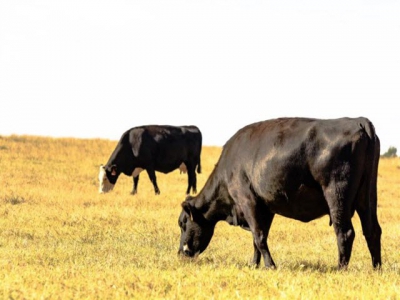Study looks to reduce methane gas emissions in cattle

Researchers will investigate whether feeding biochar to beef cattle reduces amount of methane produced
Seeking to mitigate the greenhouse gas contributions of Alberta, Canada’s agricultural sector, a University of Lethbridge-led study has been granted $1.1 million by the federal government’s Agricultural Greenhouse Gases Program.
“Canadian farmers are great stewards of the land and the environment. These new investments are part of the government’s commitment to addressing climate change and ensuring our farmers are world leaders in the use and development of clean and sustainable technology and processes,” says Lawrence MacAulay, Minister of Agriculture and Agri-Food.
Dr. Erasmus Okine, University of Lethbridge vice president (research), is principal investigator on the study, which will investigate whether the use of biochar in beef cattle diets reduces the amount of methane they produce.
Reducing greenhouse gases
Because a single cow can produce 200 to 500 liters of methane a day, the cattle industry is estimated to be responsible for about 38 percent of agricultural greenhouse gases. Cattle release methane and carbon dioxide by silently belching about once a minute. If they don’t release the gas, they begin to bloat, a serious condition that can lead to death in a short time. Okine and his fellow researchers want to find a way to reduce the amount of methane produced while still maintaining a productive herd.
The project, one of 20 across Canada to receive funding through the Agricultural Greenhouse Gases Program, is called Assessment of the Potential of Biochar Added to Beef Cattle Diets to Reduce Greenhouse Gas Emissions in Agriculture.
“Reducing the amount of greenhouse gases produced by the cattle sector is important environmentally, economically and helps build public trust,” says Okine. “Producers want to operate in a sustainable fashion and our study results will help them do that.”
Study methodology
The researchers will be testing the effects of biochar, a charcoal-rich product that results from pyrolysis of biomass, which can include wood, manure, leaves and organic waste as starter material. Pyrolysis is burning a substance in the absence of oxygen and, in this study, the researchers will use biochar created from wood products.
In the lab, biochar has been shown to create favorable conditions for the growth of bacteria that aid in digestion. The research study will examine whether small amounts of biochar added to cattle feed improves the efficiency of digestion and thereby reduces the amount of methane produced.
“What we are trying to do is a proof of concept in terms of adding biochar to the feed and to see whether there are benefits on the larger scale to the cattle we are testing,” says Okine.
The first step of the study is to analyze the content of six biochar products to determine the best product to use in the study. Once a biochar product has been chosen, the study will move to Agriculture and Agri-Food Canada’s Lethbridge Research and Development Centre, where the biochar will be added to cattle feed, first on individual animals in chambers and then in a feedlot setting. Researchers will calculate the methane produced, measure the average daily gain, monitor the health of the cows, analyze the manure and test its effect on soils. In the feedlot setting, average daily gains and feed conversion efficiency will be evaluated.
“This research project shows the role the U of L can play in helping mitigate the negative aspects of methane emission by livestock, make livestock production environmentally and economically sustainable, and provide social acceptance due to the impact we have on the reduction of methane and greenhouse gas,” says Okine.
Có thể bạn quan tâm
 How nutrition influences dairy cow health, immunity
How nutrition influences dairy cow health, immunity Balanced nutrition greatly affects immune function, performance in transition cows
 Forage analysis crucial to accurate ruminant rations
Forage analysis crucial to accurate ruminant rations NIR analysis aids in combating variability, identifying accurate nutrient, mineral parameters
 Precision dairy rationing tools improve milk production, profits
Precision dairy rationing tools improve milk production, profits Maximizing nutrition in early lactation dairy diets can have long-lasting positive effects on production, fertility